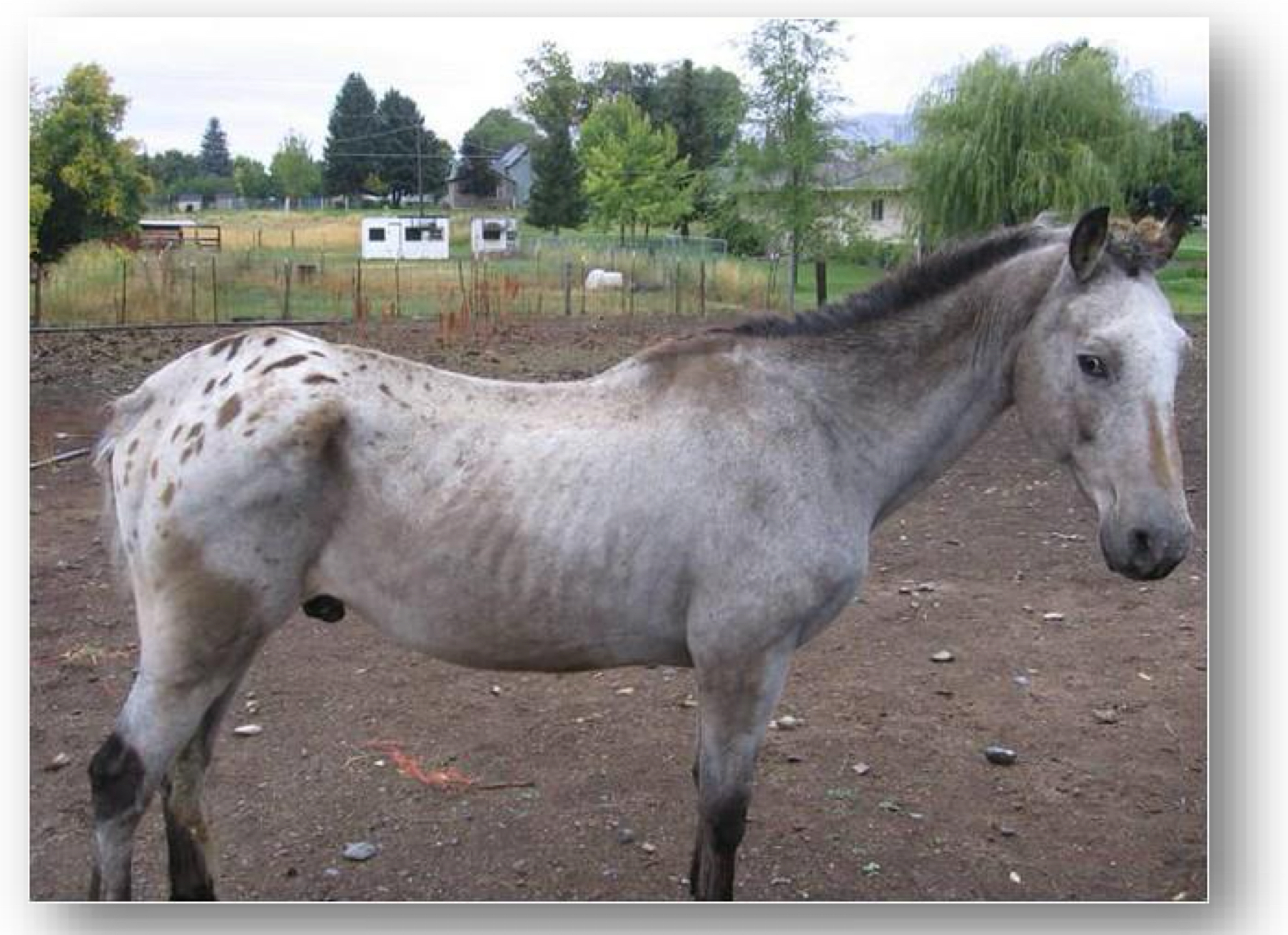L10 Horse | Nutrition
1/42
There's no tags or description
Looks like no tags are added yet.
Name | Mastery | Learn | Test | Matching | Spaced |
|---|
No study sessions yet.
43 Terms
With food and feed in equine, how does grinding affect the rate of passage and absorption of nutrients
grinding:
inc rate of passage
dec absorption of nutrients
What nutrient stimulates motility
longer fiber stimulates motility
What are the results of fermentation of grain in the large intestines in equines
results are fermentation and production of lactic acid and gas
What are the results of dehydration in equines
colic
poor performance
impaction
What leads to major water insufficiency in equines
causes:
broken equipment
poor quality/dirty/unpalatable water
water w high particle count >6500 mg/L
Which water grows blue-green algae
stagnant water
Stagnant water leads to what diseases
liver necrosis
tremors
diarrhea
death
Energy malnutrition in equines leads to fat catabolism causing what symptoms
fat catabolism
lead to hyperlipidemia (potentially)
risk in overweight horses
occur in illness during lactation
Energy malnutrition in equines leads to protein catabolism causing what symptoms
protein catabolism of liver protein
dec plasma protein
poor immunity, skin, resp, cardiac functions
skeletal muscle spared
During malnutrition of equines, once fat catabolism is depleted what does it lead to
protein catabolism
A mature horse (at maintenance) synthesizes essential AA (if there’s enough nitrogen) through what process
colonic conversion of nitrogen
A combination of essential AA (from diet) and colonic production give important protein requirements to what life stages of equine
foals
reproductive mares
(other physiological demanding life stages)
What is the protein requirement equation for mature idle horse
BW x 1.26g CP/kg BW/d
Is non-protein nitrogen a good source of nitrogen in the horse
NPN urea is not useful bc:
absorb in SI
excreted as urea in urine
Unlike hindgut fermenters, how do foregut fermenters utilize NPN
foregut fermenters’ bacteria utilize the NPN before it is absorbed in SI
If feed contains urea, how should it be calculated from the crude protein analysis
urea should be subtracted (from crude protein analysis)
With protein deficiency, what does biochemistry (CBC) look like in equines
low BUN
low albumin/TP

With protein deficiency, what are the clinical signs
edema possible
weight loss
poor skin/hair quality
poor growth
dec lactation
poor performance
Excessive protein in equines leads to what clinical signs
inc heat production
ammonia smell in urine-stall sanitation
EX Protein calculation
mature horse weighs 400 kg and is not exercising, maintaining his weight and body condition — what is the daily protein requirement for this horse
400 kg x 1.26 = 504g protein/day
Why is fiber essential to regulate (in equines)
fiber essential to regulate GI motility
provide substrate for GI microbiota
What does soluble fiber result in in equines
inc stool water content
pectin, gums
What does insoluble fiber result in in equines
lower digestibilty
cellulose, hemicellulose, ligin
producing VFA that are absorbed
Why is not necessary to provide arachidonate from diet in horses
lionelic acid is used to form arachidonic acid in horses
Why is lipids preferable to highly digestible carbohydrates in equids
lipids fulfill high energy demands whilst reducing risk of colic and laminitis
What can bind to excess phosphorus or oxalates in certain grasses
calcium
How does inc in salt intake affect equines
excess salt intake → inc drinking → inc urine
How does sweat impact potassium
inc K excretion; K deficiency
When refeeding a starved horse, what are risks in emancipated horses (what is refeeding syndrome)
diarrhea
neurologic signs
When refeeding a starved horse, what is the nutritional management
small portions of high-quality forage offered as frequent internals to stabilize insulin (every four hours)
What is the nutritional management of stallions
inc amount of concentrate in breeding stallions
avoiding obesity - poor fertility
What is the nutritional management of non-lactating mare
maintain BCS 5-6
no inc in food intake necessary until last trimester of pregnancy
What is the nutritional management of lactating mare
protein requirements inc to 13%
can be balanced w a combination of legume hay or legume grass
What is the nutritional management of weanling foals
BCS should be 4/9
A suckling foal should be offered what type of feed (and what is it)
creep feed - feed that is offered to suckling animals to support growth in addition to milk
What could be the cause of orthopedic disease in growing foal
result of accelerated growth and energy excess (which is a genetic trait)
How can you prevent foal orthopedic diseas
maintain ideal BCS 4/9
What is the major concern for performance horses
loss of electrolytes: Na, Cl, K, Mg, Ca
How to treat electrolyte deficiency in performance horses
Legume hay
salt blocks
What species of equid can feed on lignin-rich low energy food
donkeys
What happens if donkeys are fed the same as horses
metabolic complications (such as obesity, hyperlipidemia, laminitis)
What should you avoid in diet of donkeys
avoid concentrates and too rich foods (→ lead to high risk for laminitis and colic)
What is the ideal BCS of equine
4-6 BCS